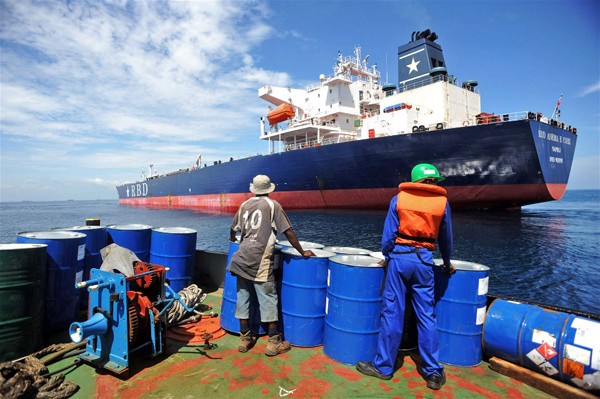Iranian Ship Linked to Houthi Attacks Heads Home Amid Tensions
(Bloomberg) — An Iranian ship that’s been linked to Houthi attacks in the Red Sea is returning home, removing a prominent asset in the area as the Islamic Republic braces...


A crew member prepares to board a tanker that was hijacked by pirates in Benin on 24 July 2011. Photo: IRIN/Daniel Hayduk
LONDON, June 18 (Reuters) – Pirate attacks off West Africa’s mineral-rich Gulf of Guinea have almost doubled from last year and threaten to increase the costs and jeopardise the shipping of commodities from the region.
The Gulf of Guinea, which includes Nigeria, Ghana and Ivory Coast, is a major source of oil and cocoa and increasingly metals for world markets, although international navies are not actively engaged in counter-piracy missions in the region.
Unlike waters off Somalia and the Horn of Africa, where ships can transit past at high speed with armed guards on board, many vessels have to anchor off West African coastal nations, with little protection, making them a soft target for criminals.
A study published on Tuesday showed piracy in the Gulf of Guinea cost the world economy between $740 million and $950 million last year and that figure is expected to grow in 2013.
Kaija Hurlburt of advocacy group Oceans Beyond Piracy (OBP), which co-authored the report, said the type of vessels attacked had become more diverse. “The impact on the commercial trade sector is a problem,” she said.
A separate study by OBP earlier this year estimated the cost of Somali piracy fell 12.5 percent in 2012 to $5.7 billion-$6.1 billion, helped by vigorous navy action, the deployment of private armed security guards and defensive measures on ships.
In contrast, the World Bank in April estimated Somali piracy may still cost the world economy about $18 billion a year.
Data from watchdog the International Maritime Bureau, another of the latest study’s authors, showed attacks in the Gulf of Guinea for the year to date reached 67 incidents, versus 34 in the same period last year. These included five attacks off Togo, versus five in the same period last year.
Apart from the fear of increasingly violent attacks in the Gulf of Guinea, the study said seafarers were concerned that authorities in the region could not be relied upon.
“We had a ‘port inspection’ and they took eight tins of paint, two coils of rope, and several bottles of whiskey,” one seafarer said in the report. “If the ‘authorities’ do this, who do we rely on for help?”
HIGHER INSURANCE COSTS
Last week the Joint War Committee, which groups syndicate members from the Lloyd’s Market Association (LMA) as well as representatives from London’s insurance company market, added Togo to its list of high risk areas for merchant shipping, which already includes Nigeria and Benin.
“We were recognising the trend of increased risk to the assets the market insures,” LMA senior executive Neil Roberts told Reuters. “All the reports indicate the situation will continue for a while. We need to be alive to that as insurers.”
The study, which was also put together by industry alliance the Maritime Piracy Humanitarian Response Programme, estimated the total insurance cost for the Gulf of Guinea last year was between $423 million to $437 million.
“We expect, especially with the expansion of the high risk zone by the Joint War Committee, that is going to lead to a higher cost of insurance,” said OBP’s Hurlburt.
“We have already seen a greater number of kidnappings for ransoms,” she said. “There might be a higher cost for private security as we move forward.”
Analysts say while Somali gangs have focused on capturing vessels to extract ransom money, criminality in West Africa, including oil theft, poses more complex problems. (Editing by James Jukwey)
(c) 2013 Thomson Reuters, Click For Restrictions
Join the gCaptain Club for curated content, insider opinions, and vibrant community discussions.


Join the 105,983 members that receive our newsletter.
Have a news tip? Let us know.
Access exclusive insights, engage in vibrant discussions, and gain perspectives from our CEO.
Sign Up




Maritime and offshore news trusted by our 105,983 members delivered daily straight to your inbox.



Essential news coupled with the finest maritime content sourced from across the globe.
Sign Up